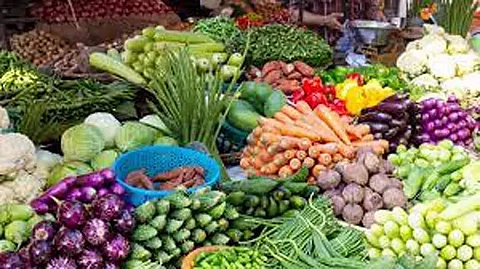
- Home
- Live Blog
- Breaking News
- Top Headlines
- Cities
- NE News
- Sentinel Media
- Sports
- Education
- Jobs

STAFF REPORTER
GUWAHATI: Residents of the city complain on a regular basis about unnaturally high prices of vegetables here. These complaints are justified, because the prices of vegetables increase four to six times while being transported a distance of around 80 kilometres from source to the retail markets of Guwahati.
The irony is that neither the farmers nor the consumers benefit from this phenomenon.
The question arises as to who is responsible for this state of affairs and who benefits? There are a few factors at work. Firstly, there are the middlemen, and then there is a section of policemen who take their cut from each consignment of vegetables which enters the city. The situation is aggravated by the high price of diesel and, equally significantly, the government's inability to set up a proper market system.
The major portion of vegetables comes to Guwahati from Kharupetia in the Darrang district, a distance of 81 kilometres. Over the last two days, farmers of Kharupetia have been selling cauliflower, cabbage and kohlrabi (ul-kobi) at the wholesale rate of Rs 7 per kg. However, these three vegetables are being sold at Rs 50 per kg in the Guwahati market as on Thursday. Similarly, aubergine (brinjal) is being sold at Rs 10 per kg by farmers in Kharupetia, whereas it is being sold at Rs 60 per kg here; capsicum costs Rs 25 per kg there and Rs 100 per kg here; radish costs Rs 10 there and Rs 40 here; French bean costs Rs 30 there and Rs 100 here; and carrot costs Rs 30 there and Rs 80 here.
While the government keeps on claiming that it is taking steps for facilitating transportation and marketing of farmers' produce, these are clearly insufficient because the farmers are not getting the benefit of high prices.
The transport subsidy provided to farmers by the Agriculture Department is too meagre to be of any help. The government had adopted a scheme for purchasing vegetables in bulk at sources of production, but that has proved to be not up to par. This has left the field open for middlemen to rule the roost.
It is common knowledge that this is the peak season for production of vegetables. However, it is a matter of concern that the Agriculture Department has failed to evolve a mechanism for bulk procurement at source – as is done in the case of paddy - to ensure that farmers receive a fair price and the consumers also benefit by way of comparatively cheaper retail prices.
Interestingly, the Agriculture Department says that it has no role to play in fixing minimum prices of vegetables and that it is the role of the district administrations concerned to do so. On the other hand, the district administrations assert that since vegetables are perishable, the prices are automatically fixed as per demand and supply. As passing of the buck continues thus, vegetable farmers and consumers alike continue to get the short end of the stick.
Also Watch: